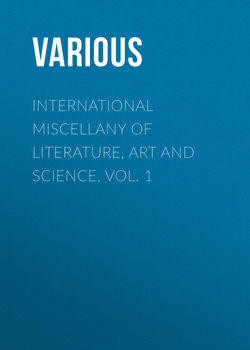Читать книгу International Miscellany of Literature, Art and Science, Vol. 1 - Various - Страница 7
DR. GUTZLAFF, THE MISSIONARY
ОглавлениеCHARLES GUTZLAFF the famous missionary in China is described in the Grenzboten by a writer who lately heard him preach at Vienna, as a short, stout man, with a deep red face, a large mouth, sleepy eyes, pointed inward and downward like those of a China man, vehement gesticulations, and a voice more loud than melodious. He has acquired in his features and expression something like the expression of the people among whom he lives. His whole manners also, as well as his face, indicate the genuine son of Jao and Chun, so that the Chinese when they encounter him in the street salute him as their countryman. We translate for The International the following sketch of his life and labors:
Charles Gutzlaff was born in 1803, at Pyritz, a village of Pomerania. His zeal as an apostle was first manifested some fifteen years ago. He married an English woman, who was animated with the same aspiration as himself and who accompanied him on his voyages as a missionary. His extensive acquaintance with the Chinese and kindred languages even then made deep impression on Robert Morrison, the founder of the Evangelical Mission in China, whom he joined in 1831 at Macao, and caused his Acquaintance to be much sought by the merchants. In 1832 and 1833 he was employed as an interpreter on board ships engaged in smuggling opium, but turned this occupation, which in itself was not of a very saintly character, to his religious ends, by the dissemination of tracts and Bibles. A missionary journey to Japan which he undertook in 1837 was without any result. After Morrison's death Gutzlaff was appointed Chinese Secretary to the British Consulate at Canton, and in 1840 founded a Christian Union of Chinese for the propagation of the Gospel among their countrymen. His present journey through Europe has a similar purpose, the foundation of Missionary Societies for the spread of Christianity in China.
His literary labors have had an almost incredible extent and variety. He Himself gives the following enumeration of his writings: "In Dutch I have written: a History of our Mission and of distinguished Missionaries, and an appeal for support of the Missionary Work; in German: Sketches of the Minor Prophets; in Latin: The Life of our Savior; in English: Sketches of Chinese History; China Opened; Life of Kanghe, together with a great number of articles on the Religion, History, Philosophy, Literature and Laws of the Chinese; in Siamese: a Translation of the New Testament, with the Psalms, and an English-Siamese Dictionary, English-Cambodian Dictionary and English-Laos Dictionary. These works I left to my successors to finish, but with the exception of the Siamese Dictionary they have added nothing to them. In Cochin-Chinese: a Complete Dictionary Cochin-Chinese-English and English-Cochin-Chinese; this work is not yet printed. In Chinese: Forty Tracts, along with three editions of the Life of our Savior; a Translation of the New Testament, the third edition of which I have carried through the press. Of the Translations of the Old Testament the Prophets and the two first books of Moses are completed. In this language I have also written The Chinese Scientific Monthly Review, a History of England, a History of the Jews, a Universal History and Geography, on Commerce, a short Account of the British Empire and its Inhabitants, as well as a number of smaller articles. In Japanese: a Translation of the New Testament, and of the first book of Moses, two tracts, and several scientific pamphlets. The only paper to which I now send communications is the Hong Kong Gazette, the whole Chinese department of which I have undertaken. Till the year 1842 I wrote for the Chinese Archives."
The writer in the Grenzboten goes on to say that "so vast a surface as these writings cover, requires a surprising facility of mind and an indefatigable perseverance. When you see the man engaged in his missionary toils you understand the whole at once. He arrives in a city and hastens to the church which is prepared for his reception. After preaching for an hour with the greatest energy he takes up his collection and is gone. He speaks with such rapidity that it is hardly possible to follow him. Such rapidity is not favorable to excellence in the work. Of all his writings, only one work is known to me, that published in Munich, in 1847, under the title of 'Gutzlaffs History of the Chinese Empire from the earnest times to the Peace of Nankin'. In our imperfect acquaintance with Chinese history this compendium is not without value, but it displays no critical power, and is a mere external compilation and poorly written. From it we learn as good as nothing of the peculiar customs and state of mental culture of the country. The whole resembles a Christian History of the World written in the eighteenth century, Beginning with Adam and Eve, and leaving the Greeks and Romans out altogether because they were without a divine revelation."
Mr. Gutzlaff's family were recently for several months in the United States, and the proceedings of the great missionary—second in eminence only to our own Judson—have always been regarded with much interest by the American churches.
